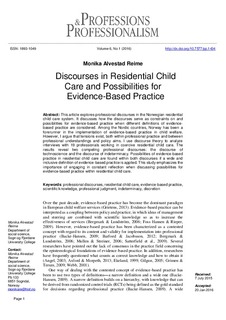Discourses in residential child care and possibilities for evidence-based practice
Journal article, Peer reviewed
Permanent lenke
http://hdl.handle.net/11250/2434651Utgivelsesdato
2016Metadata
Vis full innførselSamlinger
Sammendrag
This article explores professional discourses in the Norwegian residential child care system. It discusses how the discourses serve as constraints on and possibilities for evidence-based practice when different definitions of evidencebased practice are considered. Among the Nordic countries, Norway has been a forerunner in the implementation of evidence-based practice in child welfare. However, I argue that tensions exist, both within professional practice and between professional understandings and policy aims. I use discourse theory to analyze interviews with 19 professionals working in coercive residential child care. The results reveal two competing professional discourses: the discourse of technoscience and the discourse of indeterminacy. Possibilities of evidence-based practice in residential child care are found within both discourses if a wide and inclusive definition of evidence-based practice is applied. This study emphasizes the importance of engaging in constant reflection when discussing possibilities for evidence-based practice within residential child care.
